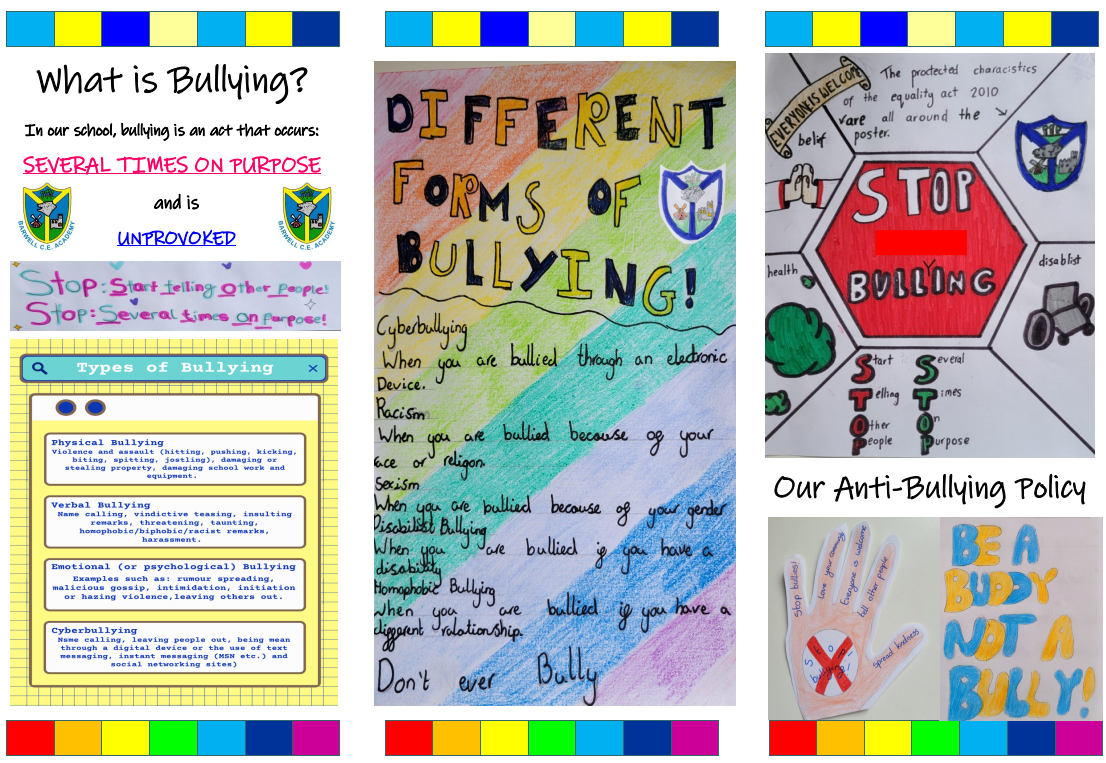Anti-Bullying


We want all children, regardless of their individual circumstances, to be happy, confident and successful. In order to fully achieve this vision, we need children to feel safe and secure both in our school and in the wider community. We want children to feel as though they can talk about their emotions and come to us to express concerns or worries, no matter how small they may perceive them to be.
Working as part of a collective school team, including parents and the wider community, we want to equip children with the necessary skills to prevent and deal with harmful or challenging situations using restorative practices.
By teaching our children this knowledge and capability, we instil in them the power to become not only happy, confident and successful children but happy, confident and successful adults too.
If children are happy, safe and secure in their school environment, this will have an impact on staff well-being and children’s learning. This policy aims to set out our whole school approach to anti-bullying including how to monitor, record and report situations and incidents to achieve our ultimate goal: to prevent bullying behaviour. It is imperative that all members of staff, parents and governors have a clear understanding of this policy to ensure consistency throughout the school and across the community. Bullying is everyone’s business.
Bullying is the deliberate, pre-meditated and REPEATED physical verbal or emotional assault of an individual or group, by a single person or group. We explain this to our children as upset that has been caused Several Times On Purpose (STOP).
Communication between home and school is key for the school to the identification and prevention of bullying. By supporting the school and their policies, and by informing school if there are any concerns, it means that situations and incidents can be dealt with swiftly and appropriately. Encouraging their child to speak to staff at school if they are worried about bullying will develop positive relationships and ensure that children feel safe and secure.

What should I do if I have concerns?
Parents who believe their child has been harmed as a result of bullying, or believes their child is harming others, should share their concerns with the school at the earliest opportunity and be prepared to work with the school to keep the children safe. The first port of call should be to contact the class teacher. All expressions of concern will be taken seriously and investigated thoroughly and, if there is a concern regarding incidents of bullying, this will be shared with the Headteacher or Deputy Headteacher. Should parents still be concerned, contact should be made with the Headteacher or the Deputy Headteacher.
Helpful Links
Beyond Bullying: http://www.beyondbullying.com/
Bullying UK: http://www.bullying.co.uk/advice-for-parents/
NHS UK: http://www.nhs.uk/Livewell/Bullying/Pages/Bullyingadviceforparents.aspx
Stop Bullying Now: http://stopbullyingnow.com/advice-for-parents-and-guardians/
Skips Safety Net: https://safetynet.skipseducational.org/
